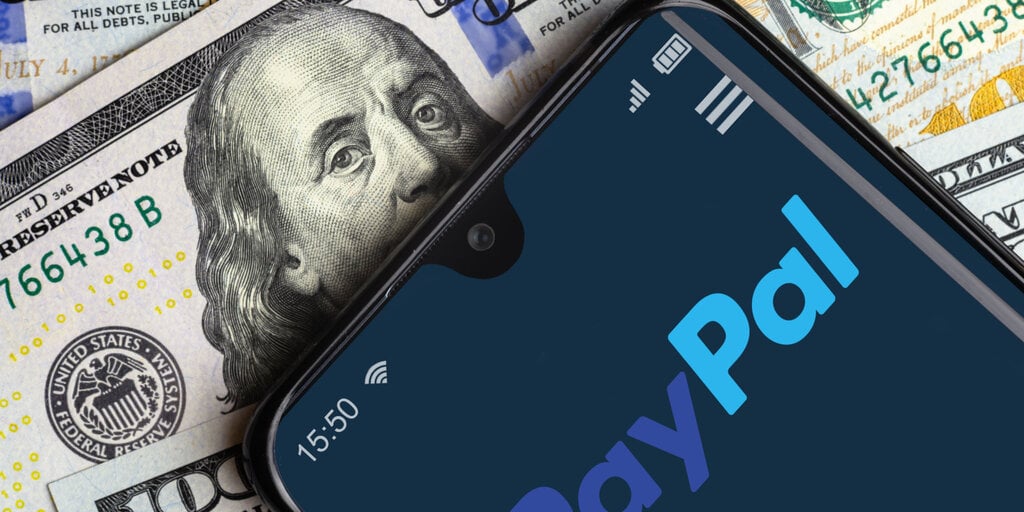PayPal’s foray into the stablecoin space with the launch of PayPal USD on Monday garnered mixed reactions among cryptocurrency enthusiasts: Some heralded the news as an industry-shaping event, while others described it as entirely tepid.
Regardless, PayPal’s decision to enter the $125-billion stablecoin market made waves. With Paxos Trust as the issuer of its PYUSD token, the move represented another incumbent force in traditional finance moving forward with plans to use crypto technology at scale.
With 431 million PayPal users across the globe, the impact of PayPal’s stablecoin launch could rival BlackRock’s spot Bitcoin ETF bid, 3iQ Head of Research Mark Connors told Decrypt. He compared PayPal’s influence among vendors to the weight of pro-Bitcoin comments made by BlackRock CEO Larry Fink, who leads one of the world’s largest asset managers.
“It’s as big of news as Larry Fink validating Bitcoin—if not bigger—because a payment system has an immediate impact,” he said. “They’re doing it because they want to be involved in the next evolutionary step of finance.”
The sentiment was echoed by Hashflow Founder and CEO Varun Kumar, who told Decrypt that PayPal’s stablecoin will increase crypto’s regular use beyond speculation, likely leading other companies to jump into the digital assets space as well.
“This is a net positive for the crypto industry and serves as another step toward mass adoption,” he said. “I anticipate we’ll see more major companies follow a similar path in the near future.”
Stablecoins are crypto tokens that are typically pegged to real-world assets, such as the U.S. dollar, and designed to hold a steady price. These tokens are crucial instruments in the crypto market and account for the vast majority of trading volume across the industry. For example, in the last 24 hours alone, more than $3 billion in Bitcoin has been traded against stablecoins, compared to just $400 million traded against U.S. dollars, per CoinGecko.
Access to the PYUSD stablecoin will be rolled out to U.S.-based PayPal customers over time. Users of the payments app Venmo will soon be able to use the stablecoin too. Eventually, PayPal plans to let people hold PYUSD in third-party digital wallets, such as MetaMask.
Providing people with more stablecoin options from trusted companies is an overall good thing, dYdX CEO Antonio Juliano told Decrypt. While Circle (USDC) and Tether (USDT) are top dogs on the stablecoin lot today, he noted that competition breeds better products.
“More competition and options for reputable stablecoins is great for the industry,” he said. “We remain big supporters of USDC [but] having additional options for stablecoins is great for consumers.” Circle’s USDC currently commands a market cap of over $26 billion while Tether’s USDT enjoys a commanding lead with an $83 billion market cap.
PayPal’s move to establish a stablecoin comes over a year after the $40 billion collapse of Terra’s UST. It was an algorithmic stablecoin that kept its price pegged to the dollar using trading incentives, as opposed to being backed by assets like U.S. treasuries. But that all fell apart when it crashed.
The crypto crisis kicked lawmakers into action, albeit slowly. And as a recently-advanced bill on stablecoin regulation works its way through Capitol Hill, Patrick McHenry (R-NC), chairman of the House Financial Services Committee, signaled it’s time to finish the job.
“It’s more important than ever that Congress enact legislation to provide comprehensive digital asset regulation, especially for stablecoins,” he said in a written statement. “We are currently at a crossroads to keep America at the forefront of digital asset innovation.”
However, a contingent of commentators on Crypto Twitter was less than enthusiastic about PayPal’s announcement. Crypto analyst Adam Cochran said PayPal’s move is lacking on Twitter because PYUSD is supposedly confined to PayPal’s services and Venmo.
“[It’s] kind of a nothing burger and mostly centralized rails,” he said, adding it was “disappointing.”
According to PayPal’s website, PayPal customers that purchase PYUSD will be able to send it to Ethereum wallet addresses in “just a few steps,” with network fees that may apply.
Hodder Law Firm founder and Managing Partner Sasha Hodder raised censorship concerns regarding PYUSD on Twitter. With the ability for PayPal to reverse transactions, among other qualities, she compared the stablecoin to a central bank digital currency (CBDC).
CBDCs are similar to stablecoins, as they are both pegged to the price of a sovereign currency. However, stablecoins are issued by private companies on public networks, as opposed to CBDCs which are often maintained privately by their respective governments or central banks.
Hodder said PYUSD has “all the censorship capabilities of a CBDC,” yet it is “launched by big tech instead of the government” at the same time.
It’s not an unfounded concern. Both Circle and Tether, centralized stablecoin issuers, have the ability and have shown a willingness to freeze accounts and void tokens when pressured by government entities.
Stay on top of crypto news, get daily updates in your inbox.
Source: https://decrypt.co/151633/paypal-pyusd-stablecoin-competition-force-regulators


